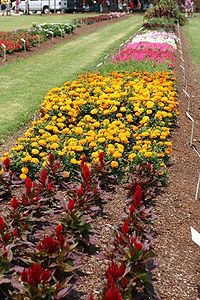
Trial garden
Encyclopedia

The Muck Crops Research Station
Muck Crops Research Station
The Muck Crops Research Station is an agriculture research facility near Kettleby and Ansnorveldt, in Ontario, Canada. It is operated by the Department of Plant Agriculture at the University of Guelph....
, near Kettleby and Ansnorveldt
Ansnorveldt, Ontario
Ansnorveldt is a hamlet located at the northeastern edge of King Township, in Ontario, Canada. It is located in the Holland Marsh, north of Highway 9...
, in Ontario
Ontario
Ontario is a province of Canada, located in east-central Canada. It is Canada's most populous province and second largest in total area. It is home to the nation's most populous city, Toronto, and the nation's capital, Ottawa....
, Canada
Canada
Canada is a North American country consisting of ten provinces and three territories. Located in the northern part of the continent, it extends from the Atlantic Ocean in the east to the Pacific Ocean in the west, and northward into the Arctic Ocean...
, operated by the University of Guelph
University of Guelph
The University of Guelph, also known as U of G, is a comprehensive public research university in Guelph, Ontario, Canada. It was established in 1964 after the amalgamation of Ontario Agricultural College, the Macdonald Institute, and the Ontario Veterinary College...
, tests new species and houses a plant pathology laboratory. Its focus is on plants that grow in muck soil
Muck (soil)
Muck is a soil made up primarily of humus from drained swampland. It is known as black soil in The Fens of eastern England, where it was originally mainly fen and bog. It is used there, as in the United States, for growing specialty crops such as onions, carrots, celery, and potatoes...
.
Any gardener might enjoy creating his or her own trial garden to see which plants fare best in a specific garden environment. Most trials programs are very formal, with scientific designs including random replicated plots to minimise any risk of bias due to placement of plants. The volunteer judges evaluate entries for desirable qualities such as novel flower forms, flower colors, flower show above foliage, fragrance, length of flowering season, and disease or pest tolerances or resistance. Vegetables are judged looking for such traits as speed to harvest, total yield, fruit taste, fruit quality, ease of harvest, plant habit, disease, and pest resistance.
Testing organisations
- All-America SelectionsAll-America SelectionsThe mission of All-America Selections is “to promote new garden seed varieties with superior garden performance judged in impartial trials in North America.” To accomplish this, the All-America Selections organization oversees a collaborative testing program involving horticulture professionals...
(AAS). Coordinates trial gardens in more than 40 locations across the United States and Canada. - Royal Horticultural SocietyRoyal Horticultural SocietyThe Royal Horticultural Society was founded in 1804 in London, England as the Horticultural Society of London, and gained its present name in a Royal Charter granted in 1861 by Prince Albert...
(RHS). Coordinates trial gardens in the United Kingdom.

